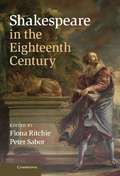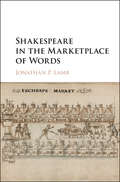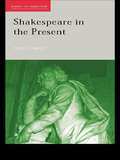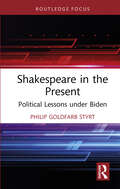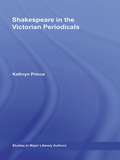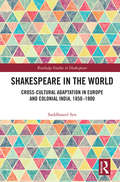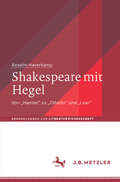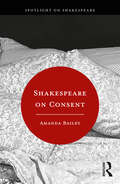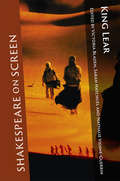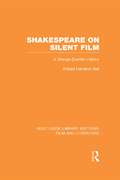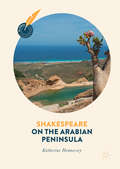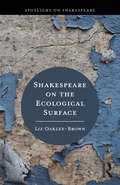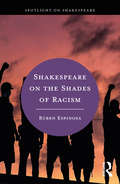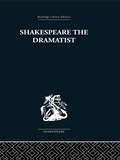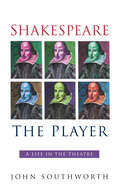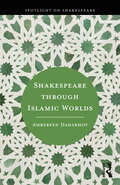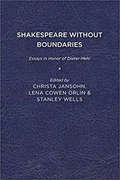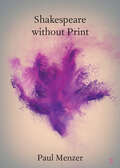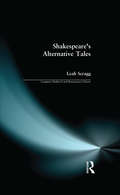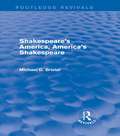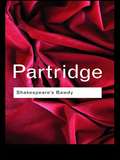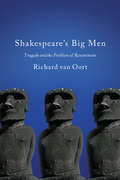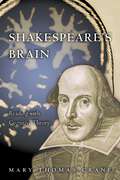- Table View
- List View
Shakespeare in the Eighteenth Century
by Fiona Ritchie Peter SaborIn the eighteenth century, Shakespeare became indisputably the most popular English dramatist. Published editions, dramatic performances and all kinds of adaptations of his works proliferated and his influence on authors and genres was extensive. By the second half of the century Shakespeare's status had been fully established, and since that time he has remained central to English culture. Shakespeare in the Eighteenth Century explores the impact he had on various aspects of culture and society: not only in literature and the theatre, but also in visual arts, music and even national identity. The eighteenth century's Shakespeare, however, was not our Shakespeare. In recovering the particular ways in which his works were read and used during this crucial period in his reception, this book, with its many illustrations and annotated bibliography, is the clearest way into understanding this key phase in the reception of the playwright.
Shakespeare in the Marketplace of Words
by Lamb Jonathan P.Making innovative use of digital and library archives, this book explores how Shakespeare used language to interact with the verbal marketplace of early modern England. By also combining word history with book history, Jonathan P. Lamb demonstrates Shakespeare's response to the world of words around him, in and through the formal features of his works. In chapters that focus on particular rhetorical features in Richard II, The Merchant of Venice, As You Like It, Hamlet, and Troilus and Cressida, Lamb argues that we can best understand Shakespeare's writing practice by scrutinizing how the formal features of his works circulated in an economy of imaginative writing. Shakespeare's interactions with this verbal market preceded and made possible his reputation as a playwright and dramatist. He was, in his time, a great buyer and seller of words.
Shakespeare in the Present (Accents on Shakespeare)
by Terence HawkesShakespeare in the Present is a stunning collection of essays by Terence Hawkes, which engage with, explain, and explore 'presentism'. Presentism is a critical manoeuvre which uses relevant aspects of the contemporary as a crucial trigger for its investigations. It deliberately begins with the material present and lets that set the interrogative agenda. This book suggests ways in which its principles may be applied to aspects of Shakespeare's plays.Hawkes concentrates on two main areas in which Presentism impacts on the study of Shakespeare. The first is the concept of 'devolution' in British politics. The second is presentism's commitment to a reversal of conceptual hierarchies such as primary/secondary and past/present, and the interaction between performance and reference. The result is to sophisticate and expand our notion of performing and to refocus interest on what the early modern theatre meant by the activity it termed 'playing'.
Shakespeare in the Present: Political Lessons under Biden (Routledge Focus on Literature)
by Philip Goldfarb StyrtShakespeare in the Present: Political Lessons under Biden is the first case study in applying the lessons of Shakespeare’s plays to post-Trump America. It looks at American politics through the lens of Shakespeare, not simply equating figures in the contemporary world to Shakespearean characters, but showing how the broader conditions of Shakespeare’s imagined worlds reflect and inform our own. Clearly written, in a direct and engaging style, it shows that reading Shakespeare with our contemporary Washington in mind can enrich our understanding of both his works and our world. Shakespeare wrote for his own time, but we always read him in our present. As such, the way we read him now is always affected by our own understanding of our own political world. This book provides quick critical analyses of Shakespeare’s plays and contemporary American politics while serving as an introduction for undergraduates and general readers to this kind of topical, presentist criticism of Shakespeare.
Shakespeare in the Victorian Periodicals (Studies in Major Literary Authors)
by Kathryn PrinceBased on extensive archival research, Shakespeare in the Victorian Periodicals offers an entirely new perspective on popular Shakespeare reception by focusing on articles published in Victorian periodicals. Shakespeare had already reached the apex of British culture in the previous century, becoming the national poet of the middle and upper classes, but during the Victorian era he was embraced by more marginal groups. If Shakespeare was sometimes employed as an instrument of enculturation, imposed on these groups, he was also used by them to resist this cultural hegemony.
Shakespeare in the World of Communism and Socialism
by Irena Makaryk Joseph G PriceThe works of William Shakespeare have long been embraced by communist and socialist governments. One of the central cultural debates of the Soviet period concerned repertoire, including the usefulness and function of pre-revolutionary drama for the New Man and the New Society. Shakespeare survived the byzantine twists and turns of Soviet cultural politics by becoming established early as the Great Realist whose works should be studied, translated, and emulated. This view of Shakespeare as a humanist and realist was transferred to a host of other countries including East Germany, Hungary, Poland, China, and Cuba after the Second World War.Shakespeare in the Worlds of Communism and Socialism traces the reception of Shakespeare from 1917 to 2002 and addresses the relationship of Shakespeare to Marxist and communist ideology. Irena R. Makaryk and Joseph G. Price have brought together an internationally-renowned group of theatre historians, practitioners, and scholars to examine the extraordinary conjunction of Shakespeare and ideology during a fascinating period of twentieth-century history. Roughly historical in their arrangement, the essays in this collection suggest the complicated and convoluted trajectory of Shakespeare's reputation. The general theme that emerges from this study is the deeply ambivalent nature of communist Shakespeare who, like Feste's 'chev'ril glove,' often simultaneously served and subverted the official ideology. Contributors:Alexey BartoshevitchLaura Raidonis BatesMaria Clara Versiani GaleryLawrence GuntnerWerner HabichtMaik HamburgerMartin HilskýKrystyna Kujawinska-CourtneyIrena R. MakarykZoltán MárkusSharon O'DairArkady OstrovskyJoseph G. PriceLaurence SenelickShu-hua WangRobert WeimannXiao Yang Zhang
Shakespeare in the World: Cross-Cultural Adaptation in Europe and Colonial India, 1850-1900 (Routledge Studies in Shakespeare)
by Suddhaseel SenShakespeare in the World traces the reception histories and adaptations of Shakespeare in the nineteenth century, when his works became well-known to non-Anglophone communities in both Europe and colonial India. Sen provides thorough and searching examinations of nineteenth-century theatrical, operatic, novelistic, and prose adaptations that are still read and performed, in order to argue that, crucial to the transmission and appeal of Shakespeare’s plays were the adaptations they generated in a wide range of media. These adaptations, in turn, made the absorption of the plays into different "national" cultural traditions possible, contributing to the development of "nationalist cosmopolitanisms" in the receiving cultures. Sen challenges the customary reading of Shakespeare reception in terms of "hegemony" and "mimicry," showing instead important parallels in the practices of Shakespeare adaptation in Europe and colonial India. Shakespeare in the World strikes a fine balance between the Bard’s iconicity and his colonial and post-colonial afterlives, and is an important contribution to Shakespeare studies.
Shakespeare mit Hegel: Von „Hamlet“ zu „Othello“ und „Lear“ (Abhandlungen zur Literaturwissenschaft)
by Anselm HaverkampShakespeare mit Hegel nimmt die gemeinsame Wurzel von Literatur und Philosophie beim Wort. Aus Hegels Lektüre Shakespeares erwächst in der Phänomenologie des Geistes ein neuer, dialektischer Begriff von Geschichte, der in nuce bereits ein ‚negativ dialektischer&‘ ist und bei Adorno zu Anlass, Ärgernis und Hoffnung Ästhetischer Theorie wird. Die begriffliche Ausarbeitung der seit Hegels Ästhetik immer neu diskutierten dialektischen Natur der Kunst ist in Hegels Rezeption Shakespeares nicht nur generell nachzuweisen, sondern wird hier in der buchstaben-genauen Lektüre, die Hegel praktiziert hat, aber von Philosophen kaum beachtet worden ist, identifiziert und in ihren Voraussetzungen und Konsequenzen nachgezeichnet. Herauskommt dabei ein anderer Hegel und ein neuer, historisch spektakulärer Shakespeare. Es handelt sich bei diesem Buch um eine in konzentrierten Analysen enggeführte, historisch konkretisierte Zusammenführung und Neusituierung der Schnittstellen eines philosophischen und literaturwissenschaftlichen Erkenntnisinteresses, als dessen letzter, Hegel weiterführender, aber aporetisch schwieriger Gesamtentwurf Adornos Ästhetische Theorie neu zu lesen ist.
Shakespeare on Consent (Spotlight on Shakespeare)
by Amanda BaileyChoice is the defining issue of the twenty-first century. As the #MeToo movement extends its legal, social, and political reach around the world, the topic of consent has come under particular scrutiny. Shakespeare on Consent examines crises of consent on the early modern stage and argues that these dramatizations provide a framework for understanding the intersections of coercion, complicity, resistance, and agency. Beginning with the premise that the apparatus of consent serves as a lever of entitlement, Amanda Bailey introduces a Shakespeare well aware that liberal selfhood has never been universally available. Bailey brings Shakespeare’s work into conversation with the Penn State Sandusky scandal, the Bill Clinton–Monica Lewinsky affair, the rise of "somnophilia," Jordan Peele’s documentary on Lorena Bobbitt, Larry David’s Curb Your Enthusiasm, and Harvey Weinstein’s Shakespeare in Love, amongst others. Bailey considers who is denied access to the apparatus of consent, under what circumstances, and how consent is vitiated by race, class, ethnicity, sexuality, disability, and gender. Shakespeare on Consent is a wake-up call for all implicated in the injurious outcomes of consent and will inspire those wanting to mobilize choice in the service of social and political transformation.
Shakespeare on Screen: King Lear (Shakespeare on Screen)
by Sarah Hatchuel Vienne-Guerrin Nathalie Victoria BladenThe third volume in the re-launched series Shakespeare on Screen is devoted to film versions and adaptations of King Lear. Bringing together an international group of scholars, the chapters provide new insights and perspectives on what constitutes 'Learness' in a range of films, TV productions, translations, free retellings and appropriations from around the world. Taking 'screen' in its broader sense, it also covers digital material such as video archives, internet movies and YouTube videos. The volume features an invaluable film-bibliography and accompanying online resources include additional essays and an expanded version of the film-bibliography.
Shakespeare on Silent Film: A Strange Eventful History (Routledge Library Editions: Film and Literature)
by Robert Hamilton BallIn 1899, when film projection was barely three years old, Herbert Beerbohm Tree was filmed as King John. In his highly entertaining history, Robert Hamilton Ball traces in detail the fate of Shakespeare on silent films from Tree’s first effort until the establishment of sound in 1929. The silent films brought Shakespeare to a wide public who had never had the chance to see his plays in the theatre. And Shakespeare gave the film makers an air of respectability that was badly needed by a medium with a reputation for frivolity. This work, first published in 1968, brings history to life with excerpts from scenarios, from reviews and from contemporary film journals, and with reproduction of stills and frames from the films themselves, including unusual shots of leading screen actors. This is a valuable source book for film experts, enhanced by full notes, bibliography and indexes; a fresh approach for Shakespeareans; and a vivid sketch of a world that has passed for all.
Shakespeare on the Arabian Peninsula (Global Shakespeares)
by Katherine HennesseySince the turn of the millennium, the Arabian Peninsula has produced a remarkable series of adaptations of Shakespeare. These include a 2007 production of Much Ado About Nothing, set in Kuwait in 1898; a 2011 performance in Sharjah of Macbeth, set in 9th-century Arabia; a 2013 Yemeni adaptation of The Merchant of Venice, in which the Shylock figure is not Jewish; and Hamlet, Get Out of My Head, a one-man show about an actor’s fraught response to the Danish prince, which has been touring the cities of Saudi Arabia since 2014.This groundbreaking study surveys the surprising history of Shakespeare on the Arabian Peninsula, situating the current flourishing of Shakespearean performance and adaptation within the region’s complex, cosmopolitan, and rapidly changing socio-political contexts. Through first-hand performance reviews, interviews, and analysis of resources in Arabic and English, this volume brings to light the ways in which local theatremakers, students, and scholars use Shakespeare to address urgent regional issues like authoritarianism, censorship, racial discrimination and gender inequality.
Shakespeare on the Ecological Surface (Spotlight on Shakespeare)
by Liz Oakley-BrownShakespeare on the Ecological Surface uses the concept of the ‘surface’ to examine the relationship between contemporary performance and ecocriticism. Each section looks, in turn, at the 'surfaces' of slick, smoke, sky, steam, soil, slime, snail, silk, skin and stage to build connections between ecocriticism, activism, critical theory, Shakespeare and performance. While the word ‘surface’ was never used in Shakespeare’s works, Liz Oakley-Brown shows how thinking about Shakespearean surfaces helps readers explore the politics of Elizabethan and Jacobean culture. She also draws surprising parallels with our current political and ecological concerns. The book explores how Shakespeare uses ecological surfaces to help understand other types of surfaces in his plays and poems: characters’ public-facing selves; contact zones between characters and the natural world; surfaces upon which words are written; and physical surfaces upon which plays are staged. This book will be an illuminating read for anyone studying Shakespeare, early modern culture, ecocriticism, performance and activism.
Shakespeare on the Shades of Racism (Spotlight on Shakespeare)
by Ruben EspinosaShakespeare on the Shades of Racism examines Shakespeare in relation to ongoing conversations that interrogate the vulnerability of Black and brown people amid oppressive structures that aim to devalue their worth. By focusing on the way these individuals are racialized, politicized, policed, and often violated in our contemporary world, it casts light on dimensions of Shakespeare’s work that afford us a better understanding of our ethical responsibilities in the face of such brutal racism. Shakespeare on the Shades of Racism is divided into seven short chapters that cast light on contemporary issues regarding racism in our day. Some salient topics that these chapters address include the murder of unarmed Black men and women, the militarization of the U.S. Mexico border, anti-immigrant laws, exclusionary measures aimed at Syrian refugees, inequities in healthcare and safety for women of color, international trends that promote white nationalism, and the dangers of complicity when it comes to racist paradigms. By bringing these contemporary issues into conversation with a wide range of plays that span the many genres in which Shakespeare wrote throughout his career, these chapters demonstrate how the widespread racism and discord within our present moment stands to infuse with urgent meaning Shakespeare’s attention to the (in)humanity of strangers, the ethics of hospitality, the perils of insularity, abuses of power, and the vulnerability of the political state and its subjects. The book puts into conversation Shakespeare with present-day events and cultural products surrounding topics of race, ethnicity, xenophobia, immigration, asylum, assimilation, and nationalism as a means of illuminating Shakespeare’s cultural and literary significance in relation to these issues. It should be an essential read for all students of literary studies and Shakespeare.
Shakespeare on the University Stage
by Andrew James HartleyFeaturing essays from seventeen international scholars, this exciting new collection is the first sustained study of Shakespeare on the university and college stage. Treating the subject both historically and globally, the essays describe theatrical conditions that fit neither the professional nor the amateur models and show how student performances provide valuable vehicles for artistic construction and intellectual analysis. The book redresses the neglect of this distinctive form of Shakespeare performance, opening up new ways of thinking about the nature and value of university production and its ability to draw unique audiences. Looking at productions across the world - from Asia to Europe and North America - it will interest scholars as well as upper-level students in areas such as Shakespeare studies, performance studies and theatre history.
Shakespeare the Dramatist: And other papers
by Una Ellis-FermorFirst published in 1961. On her death, Professor Ellis-Fermor left behind some uncollected essays and part of a book on Shakespeare the Dramatist. This volume includes the chapters of the unfinished work and three further articles on Shakespeare. It discusses Shakespeare's methods with regard to plot, character, diction, and imagery and it contains comparative analysis of Shakespeare with other dramatists, including Ibsen and Corneille.
Shakespeare the Player: A Life in the Theatre
by John SouthworthTo his contemporaries, Shakespeare was known as an actor, not a playwright, yet this fact has been largely ignored. This title overturns traditional images of the Bard, arguing that Shakespeare cannot be separated from his profession as a player any more than he can be separated from his works.
Shakespeare through Islamic Worlds (Spotlight on Shakespeare)
by Ambereen DadabhoyShakespeare through Islamic Worlds investigates the peculiar absence of Islam and Muslims from Shakespeare’s canon. While many of Shakespeare’s plays were set in the Mediterranean, a geography occupied by Muslim empires and cultures, his work eschews direct engagement with the religion and its people. This erasure is striking given the popularity of this topic in the plays of Shakespeare’s contemporaries. By exploring the limited ways in which Shakespeare uses Islamic and Muslim tropes and topoi, Ambereen Dadabhoy argues that Islam and Muslim cultures function as an alternate or shadow text in his works, ranging from his staged Mediterranean plays to his histories and comedies. By consigning the diverse cultures of the Islamic regimes that occupied and populated the early modern Mediterranean, Shakespeare constructs a Europe and Mediterranean freed from the presence of non-white, non-European, and non-Christian Others, which belied the reality of the world in which he lived. Focusing on the Muslims at the margins of Shakespeare’s works, Dadabhoy reveals that Islam and its cultures informed the plots, themes, and intellectual investments of Shakespeare’s plays. She puts Islam and Muslims back into the geographies and stories from which Shakespeare had evacuated them. This innovative book will be of interest to all those working on race, religion, global and cultural exchange within Shakespeare, as well as people working on Islamic, Mediterranean, and Asian studies in literature and the early modern period.
Shakespeare without Boundaries: Essays in Honor of Dieter Mehl
by David Bevington Adrian Poole Stanley Wells Catherine Belsey Peter Holland Paul Edmondson Brian Gibbons Ann Thompson Piero Boitani R. A. Foakes Ann Jennalie Cook Bruce R. Smith Phyllis Rackin Grace Ioppolo Alan Brissenden Christa Jansohn Velma Bourgeois Richmond Hugh Macrae Richmond Martin Orkin John O. Thompson Alexander Shurbanov Chee-Seng Lim Werner Habicht Marta Gibinska Jesús Tronch Catherine M.S. Alexander Georgianna ZieglerShakespeare without Boundaries: Essays in Honor of Dieter Mehl offers a wide-ranging collection of essays written by an international team of distinguished scholars who attempt to define, to challenge, and to erode boundaries that currently inhibit understanding of Shakespeare, and to exemplify how approaches that defy traditional bounds of study and criticism may enhance understanding and enjoyment of a dramatist who acknowledged no boundaries in art. The Volume is published in tribute to Professor Dieter Mehl, whose critical and scholarly work on authors from Chaucer through Shakespeare to D. H. Lawrence has transcended temporal and national boundaries in its range and scope, and who, as Ann Jennalie Cook writes, has contributed significantly to the erasure of political boundaries that have endangered the unity of German literary scholarship and, more broadly, through his work for the International Shakespeare Association, to the globalization of Shakespeare studies. Published by University of Delaware Press. Distributed worldwide by Rutgers University Press.
Shakespeare without Print (Elements in Shakespeare Performance)
by Paul MenzerEverything we know about Shakespeare – his world, his words, his work – is preconceived by print. This knowledge extends to cultural expressions that seek to evade ink, paper, and moveable type, such as performance, such as acting. Print privileges qualities quite alien to performance, however: standardization, reproducibility, and, above all, uniformity. Thus the master tropes of print occlude rather than clarify our thinking about acting. How might we think about Shakespeare and performance without print? Examining texts both early and modern, Shakespeare without Print contends that Shakespeare and performance has long been dominated by a medium alien to its expression, print, a foreign government that forecloses alternative conceptualizations and practices. Through a series of discrete but linked excursions into the relationship between Shakespearean print and Shakespearean performance, this Element auditions alternative prepositions to enfranchise scholars and practitioners from print, which currently binds and determines our various approaches to Shakespearean performance.
Shakespeare's Alternative Tales (Longman Medieval and Renaissance Library)
by Leah ScraggA knowledge of the history and evolution of the tales on which Shakespeare drew in the composition of his plays is essential for the understanding of his work. In re-telling a particular story, a Renaissance writer was not simply reshaping the structure of the narrative but participating in a species of debate with earlier writers and the meanings their tales had accrued. The stories upon which Shakespeare's plays are constructed did not descend to him as innocent collections of incidents, but brought with them considerable cultural baggage, substantially lost to the modern spectator but an essential component, for a contemporary audience, of the meaning of the work.Shakespeare's Alternative Tales explores this literary dialogue, focusing on those plays in which the expectations generated by an inherited story are in some way overthrown, setting up a tension for a Renaissance spectator between 'received' and 'alternative' readings of the text. Each chapter opens with a familiar story, supplying a context for the subsequent discussion, and exhibits the way in which the dramatist's reworking of a traditional motif interrogates the assumptions implicit in his source.While offering the twentieth-century reader a fresh perspective from which to view the plays, the approach also supplies an introduction to contemporary readings of the Shakespearean canon. The tales Leah Scragg considers may be seen as 'alternative' in more than one sense: they radically rework conventional situations, while lending themselves to analysis in terms of new critical methodologies.The text will be of interest to both students of Shakespeare and the general reader. In conjunction with the author's companion volume, Shakespeare's Mouldy Tales, it provides an ideal introduction to contemporary developments in source studies.
Shakespeare's America, America's Shakespeare: Literature, Institution, Ideology In The United States (Routledge Revivals)
by Michael D. BristolFirst published in 1990, this title explores the nature of the interaction between Shakespeare and American culture. Shakespeare stands at the center of an elaborate institutional reality, closely tied to both cultural and ideological production. His plays, Michael Bristol asserts, help to constitute a primary affirmative theme of much American culture criticism, specifically the celebration of individuality and the values of expressive autonomy. This reissue will be of particular value to Literature students and researchers with an interest in Shakespeare, as well as those interested in American cultural history more generally.
Shakespeare's Bawdy (Routledge Classics)
by Eric PartridgeThis classic of Shakespeare scholarship begins with a masterly introductory essay analysing and exemplifying the various categories of sexual and non-sexual bawdy expressions and allusions in Shakespeare's plays and sonnets. The main body of the work consists of an alphabetical glossary of all words and phrases used in a sexual or scatological sense, with full explanations and cross-references.
Shakespeare's Big Men: Tragedy and the Problem of Resentment
by Richard Van OortShakespeare's Big Men examines five Shakespearean tragedies - Julius Caesar, Hamlet, Othello, Macbeth, and Coriolanus - through the lens of generative anthropology and the insights of its founder, Eric Gans. Generative anthropology's theory of the origins of human society explains the social function of tragedy: to defer our resentment against the "big men" who dominate society by letting us first identify with the tragic protagonist and his resentment, then allowing us to repudiate the protagonist's resentful rage and achieve theatrical catharsis.Drawing on this hypothesis, Richard van Oort offers inspired readings of Shakespeare's plays and their representations of desire, resentment, guilt, and evil. His analysis revives the universal spirit in Shakespearean criticism, illustrating how the plays can serve as a way to understand the ethical dilemma of resentment and discover within ourselves the nature of the human experience.
Shakespeare's Brain: Reading with Cognitive Theory
by Mary Thomas CraneHere Mary Thomas Crane considers the brain as a site where body and culture meet to form the subject and its expression in language. Taking Shakespeare as her case study, she boldly demonstrates the explanatory power of cognitive theory--a theory which argues that language is produced by a reciprocal interaction of body and environment, brain and culture, and which refocuses attention on the role of the author in the making of meaning. Crane reveals in Shakespeare's texts a web of structures and categories through which meaning is created. The approach yields fresh insights into a wide range of his plays, including The Comedy of Errors, As You Like It, Twelfth Night, Hamlet, Measure for Measure, and The Tempest. ? Crane's cognitive reading traces the complex interactions of cultural and cognitive determinants of meaning as they play themselves out in Shakespeare's texts. She shows how each play centers on a word or words conveying multiple meanings (such as "act," "pinch," "pregnant," "villain and clown"), and how each cluster has been shaped by early modern ideological formations. The book also chronicles the playwright's developing response to the material conditions of subject formation in early modern England. Crane reveals that Shakespeare in his comedies first explored the social spaces within which the subject is formed, such as the home, class hierarchy, and romantic courtship. His later plays reveal a greater preoccupation with how the self is formed within the body, as the embodied mind seeks to make sense of and negotiate its physical and social environment.
